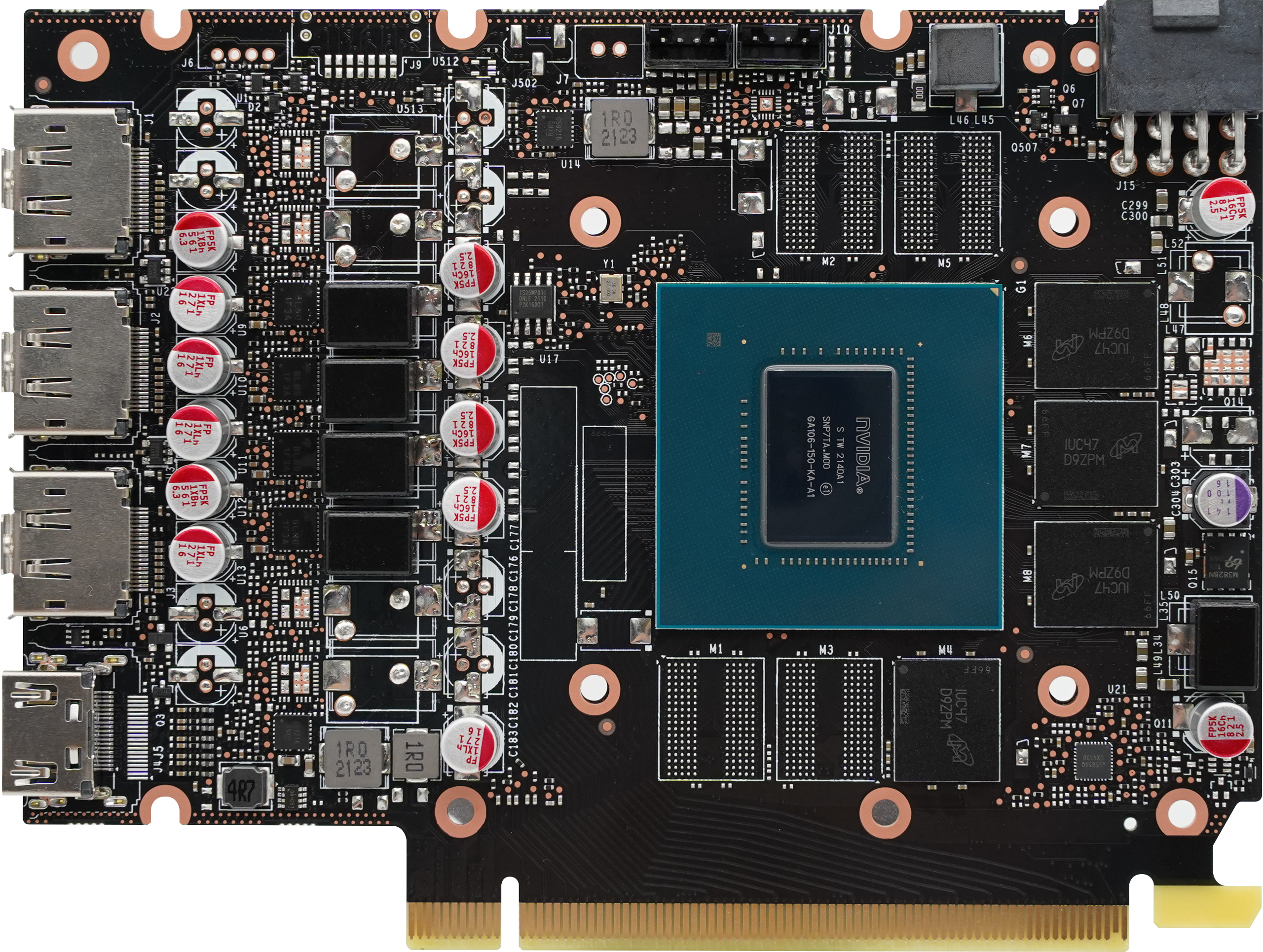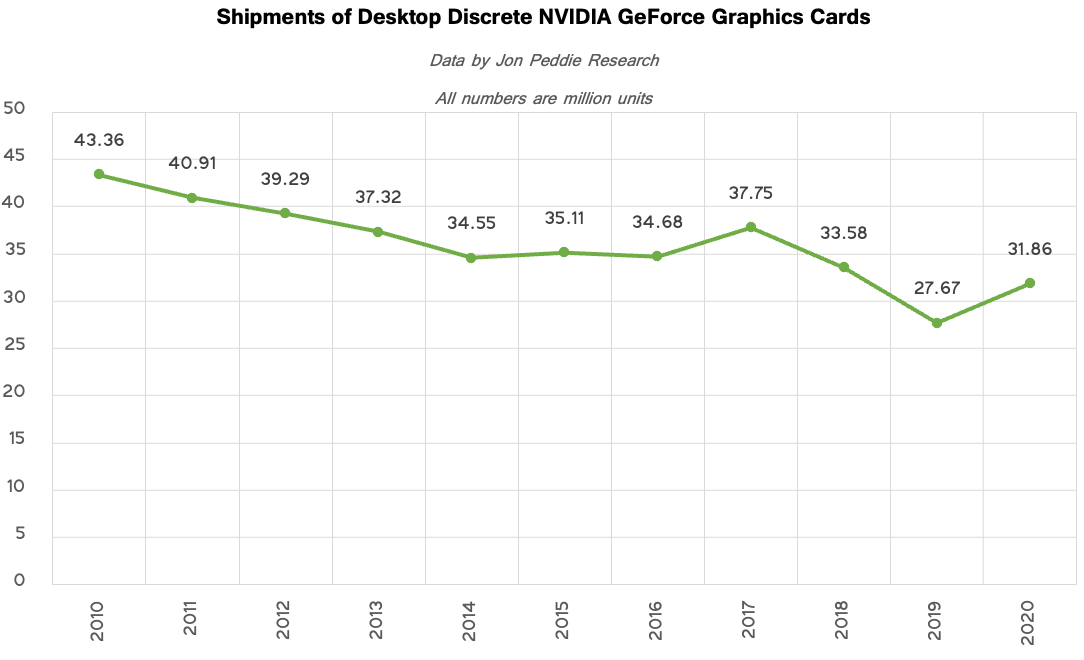Nvidia Uses Expensive GA106 for Cheap RTX 3050, But What's The Point?
Die size doesn't matter?
Being in control of a whopping 79% of the desktop discrete graphics cards (many of which are among the best graphics cards around) has its perks. Amid supply glut, Nvidia can play with silicon parts it uses. It may have its advantages with the availability of relatively inexpensive components, and we will try to explain why.
Nvidia introduced its GeForce RTX 3050 graphics card (the list of boards is here) at a formal MSRP of $249 earlier this week. Many observers thought that the company was using its relatively inexpensive and relatively low-power GA107 graphics processing unit (GPU) for the solution. Unfortunately, this is not the case. According to Inno3D, the Green company uses a far more expensive GA106 silicon for this entry-level product. Yet this could be a good sign. Let’s try to analyze.
Inno3D sent a high-resolution render of its GeForce RTX 3050 as part of a press release without a cooling system, revealing that the PCB uses the GA106 silicon. Unfortunately, we cannot say anything about other graphics cards with the GeForce RTX 3050 badge on them for obvious reasons. Still, our humble experience with GPU companies tells us that everyone uses the same silicon at launch, but it might change over time. Anyway, Nvidia’s GA106 and GA107 are entirely different, so let’s examine these differences.
Comparison of Nvidia's GPUs
| Header Cell - Column 0 | Chip | Chip Configuration (CUDA) | Memory Interface | Die Size | MSRP |
|---|---|---|---|---|---|
| GeForce RTX 3050 desktop | GA106 | 2560 | 128-bit | 276mm2 | $249 |
| GeForce RTX 3060 desktop | GA106 | 3584 | 192-bit | 276mm2 | $329 |
| GeForce RTX 3050 notebook | GA107 | 2048 | 128-bit | Smaller than 276 mm2 | ? |
| GeForce RTX 3060 Ti notebook | GA107 | 2560 | 192-bit | Smaller than 276 mm2 | ? |
The GA106 is a reasonably large (272 mm2) chip with up to 3,584 CUDA cores enabled and an up to 170W TDP (the desktop version). The cut-down version has 2,560 CUDA cores, which overlaps with the fully-enabled GA107 graphics processor with 2,560 CUDA cores used for laptops and has a TDP range between 35W and 80W.
It is a question for Nvidia, which it is not inclined to answer publicly. However, big OEMs want one software driver, and once a company wins a contract, it lasts for a cycle, which happens to be a year in our modern world. So we can speculate that amid winning the high-performance early 2021 notebook cycle, Nvidia has reasons to have two GPUs that overlap rather than having no GPUs to ship.
The good news for PC gamers is that Nvidia has two entry-level GPUs in production. The bad news, there are miners, scalpers, and another bunch of people that will not let you get a GeForce RTX 3050 at its MSRP.
Get Tom's Hardware's best news and in-depth reviews, straight to your inbox.

Anton Shilov is a contributing writer at Tom’s Hardware. Over the past couple of decades, he has covered everything from CPUs and GPUs to supercomputers and from modern process technologies and latest fab tools to high-tech industry trends.
-
nitts999 No offense, but this article needs an editor. I've read it twice and the oddly constructed sentences are unclear and some even seem left out entirely. I'm not sure what the point was or what the big revelation was about using this silicon. Or why it "might be a good thing". Honestly nothing about this article made any sense to me at all.Reply -
Jim90 "Amid supply glut, Nvidia can play with silicon parts it uses. "Reply
--> What planet is the author living on?? -
Unolocogringo Every manufacturer of silicone parts do this.Reply
If the die has bad parts but is still usable , it becomes a lower model part.
It is called Binning.
Better than throwing away usable dies. -
scottsoapbox This article reads like only half the words got published.Reply
Like this with no lead in:
"It is a question for Nvidia, which it is not inclined to answer publicly."
What is a question? You never say.
It is a confusing mess that makes me wonder if the author was sober when writing it. -
thisisaname ReplyInno3D sent a high-resolution render of its GeForce RTX 3050 as part of a press release without a cooling system, revealing that the PCB uses the GA106 silicon.
Or they just used the wrong graphic when they did the render? -
InvalidError How much of a "waste" it is to use GA106 for the desktop RTX3050 instead of something smaller depends entirely on how many GA106 dies don't make the grade for an RTX3060(Ti). As Samsung's 8nm gets better, it could also be that Nvidia has raised its binning bars.Reply -
King_V I agree, I also kinda got the feeling that there was more text in this article, but it got cut off....Reply -
spongiemaster Reply
I don't think breast implant manufacturers do any binning of their products.Unolocogringo said:Every manufacturer of silicone parts do this.
If the die has bad parts but is still usable , it becomes a lower model part.
It is called Binning.
Better than throwing away usable dies. -
larkspur Reply
Nah - some are bigger, some are smaller. Some are firmer, while others are more squishy. Shape can vary quite a bit. Trust me - I have a LOT of hands-on experience!!!spongiemaster said:I don't think breast implant manufacturers do any binning of their products. -
King_V Replyspongiemaster said:I don't think breast implant manufacturers do any binning of their products.
Ok, so that got a near-nose-jet-of-beverage reaction from me.
larkspur said:Nah - some are bigger, some are smaller. Some are firmer, while others are more squishy. Shape can vary quite a bit. Trust me - I have a LOT of hands-on experience!!!
As a fellow professional* in this field, I approve this message.
* or "enthusiast" if you prefer that term...

